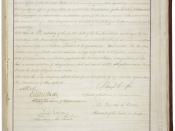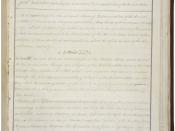The Supreme Court will soon deliver a decision on whether or not state governments can display the Ten Commandments . My goal in this essay is to thoroughly discuss and explain which decision will promote greater freedom in the United States.
The debate over the display of religious symbols in public places is one that runs very deep on both sides of the issue. Any time a debate centers on something as personal as one's spiritual beliefs, or lack thereof, you can bet that the arguments will be heated, with both sides believing they are absolutely correct.
Let's begin by taking a look at the 1st Amendment of the United States Constitution. It says, "Congress shall make no law respecting an establishment of religion, or prohibiting the free exercise thereof." According to the Dictionary, the functional meaning of the word Establishment is "Something established as 1. A church recognized by law as the official church of a nation or state, and supported by civil authority, or 2.
A permanent civil or military organization." By this definition, one could make the argument that the court, by posting a religious document such as the Ten Commandments, is establishing the religion attached to the Ten Commandments in their court. On the other side of this argument, there are people who believe that the definition of the word establishment used in the 1st amendment literally means starting a church. Usually, those on this side of the argument argue that since many of our laws are based upon the Ten Commandments, that it is not an endorsement of a particular religion, but an endorsement of our laws.
The 6th Amendment in the United States Constitution does not address the church and state issue directly, but in its description of the right to a fair...


